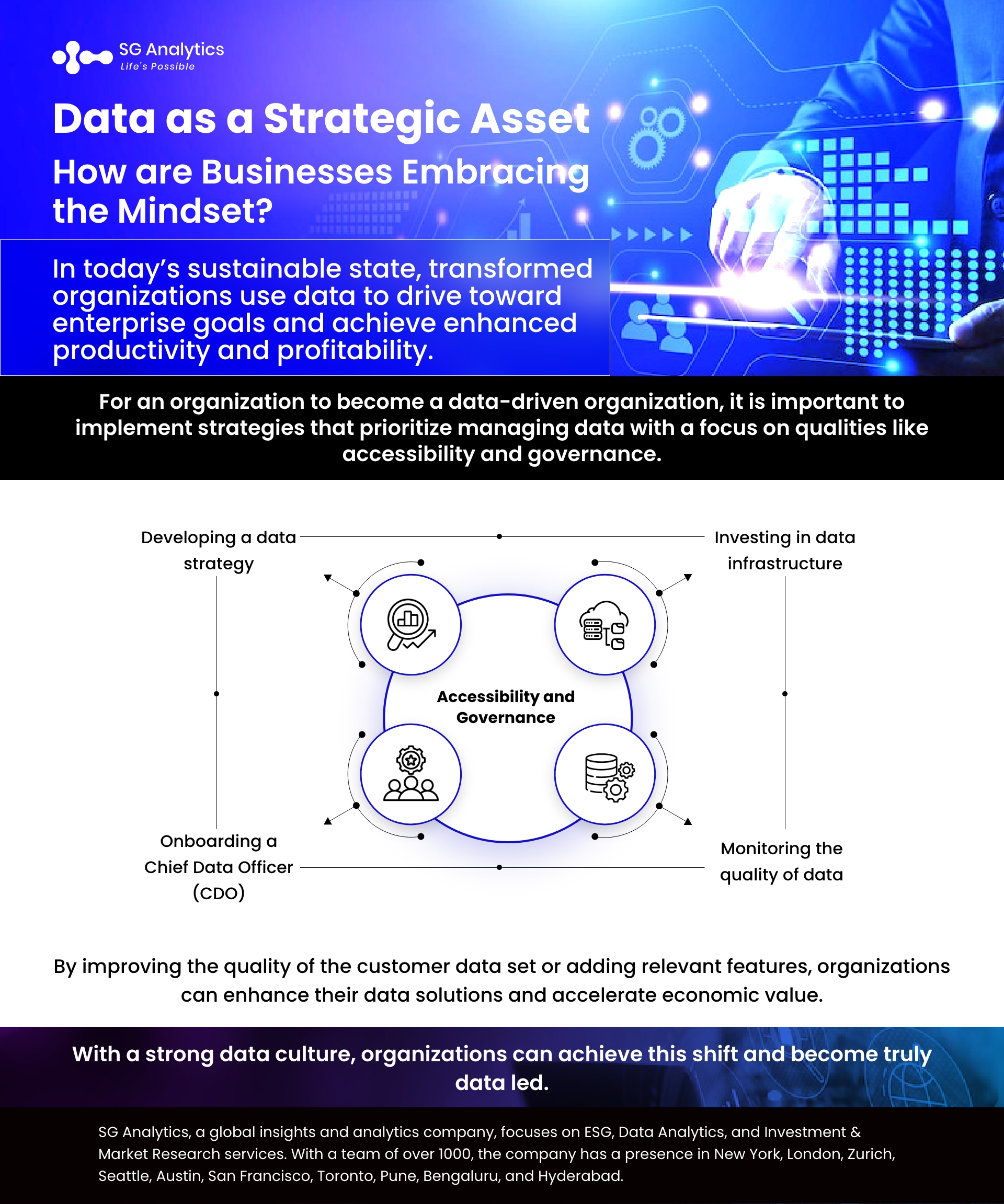In today’s data-driven world, organizations have a goldmine of valuable information with them. From customer behavior to ever-evolving market trends, data presents them with invaluable insights to make informed decisions as well as to stay ahead of the competition. However, not treating data as an asset can lead to missed opportunities for growth and costly mistakes.
Data is viewed as a costly necessity as well as a byproduct by many organizations. Therefore, they have to operate on the accumulated data effectively. Sometimes, the data can seem more like an expense than useful. But innovation is leading organizations to perceive things differently. They understand that data is indeed a strategic asset.
For an organization, an asset is one of several holdings that appreciate and generates a return. A strategic asset is deemed the most important thing an organization owns. When they approach data as a strategic asset, it can unlock the door to new insights, efficiencies, and capabilities while enabling emerging technologies. However, to reach that point of maturity, organizations need to establish an enterprise strategy along with operations that are data-driven and require a variety of phased actions to execute a transformative vision.
Read more: How to Leverage Purpose-driven Data to Accelerate Business Growth?

Data holds many unique properties — it does not deplete or deteriorate. Data can be used and re-used. Due to these qualities, the more data an organization has in store, the marginal costs flatten, and the economic value of the data grows. Moreover, that data can be used for multiple purposes. The data set can be used to determine product pricing, recommendations, and marketing campaigns for individual customers. By improving the quality of the customer data set or adding relevant features, organizations can enhance their data solutions and accelerate economic value. But what are the elements of a data strategy, and how can organizations craft a sound data strategy? Let's find out.
-
Understanding where the market is leading can help in ensuring data assets and supporting the organization’s market position.
-
Identifying the strategic objects where data is key will help in achieving success.
-
Creating data-specific objectives for the organization and pinpointing the true data value.
-
Measuring data ROI to identify the value of data, data-related objectives, and success.
-
Identifying the data strategy to visualize end goals and their contribution.
Assessing the impact of the data strategy will assist the organization in assessing the need for new skills, knowledge, and experience. At a technical level, this will help ensure that a sound data framework is established with a good set of metrics. Data transformation is a very critical and complex process, as it helps in ensuring that the organization has experts at hand who can support the process throughout the transformation.
Companies across industries are realizing the potential of their data and implementing measures to unlock that value. By tackling the complexities of a large data transformation and fostering a culture that values data, organizations are turning data into a core asset for the business.

Read more: 2023 Outlook: Top Data Analytics Technologies Transforming Organizational Operations
Tips for Organizational Strategies to Foster a Data-Driven Culture
For an organization to become a data-driven organization, it is important to implement strategies that prioritize managing data with a focus on qualities like accessibility and governance. By implementing the strategies below, organizations can foster a data-driven culture and unlock the full potential of the data for informed decision-making.
Developing a Data Strategy: Developing a comprehensive data strategy that aligns with the organization's overall goals and objectives will help in establishing clear guidelines for data collection, storage, analysis, and governance.
Investing in Data Infrastructure: Organizations that invest in modern data infrastructure like data lakes, cloud storage, or distributed cloud computing systems can handle large volumes of data and process it efficiently.
Onboarding a Chief Data Officer (CDO): By hiring a Chief Data Officer (CDO) to oversee and leverage the right data strategy within the organization. The CDO will work closely with business leaders and identify key data assets to design data-driven initiatives.

Monitoring the Quality of Data: By integrating data quality monitoring tools, organizations can ensure that the stored data within the infrastructure is accurate and consistent. This will further enable them to make informed decisions based on trustworthy data and prevent costly mistakes.
Read more: Role of Data Science, AI, and ML in Transforming Business Operations
Leveraging Data as a Strategic Asset
The critical changes in the prior phases drive the organization toward data-centric operation. By integrating systems and processes that are oriented for fast and reliable access to curated data, organizations can educate their employees and make them fluent in data use for decision-making. Organizations with high-quality data are using artificial intelligence for visual analysis, natural language processing, and predictive analytics to further automate their processes and make machine engagement more human.
A data-driven organization can position itself to monetize the data in multiple ways. This can include direct revenue in the form of data assets being sold to relevant third parties with appropriate regulations. A deeper value can be created in the form of data packages and combinations that help businesses advance and generate a financial return. The cost of storing and managing data exceeds the value realized throughout the business. With better target marketing campaigns, organizations can drive more interest, sales, and efficiency.

In today's sustainable state, transformed organizations use data to drive toward enterprise goals and achieve enhanced productivity and profitability. The key objective is to foster a data culture that values and encourages employees to employ data for informed decisions. However, this can be achieved by delivering data literacy training, setting transparent expectations around data usage, and rewarding data-driven initiatives.
Businesses are combining proprietary datasets with the vast data oceans available in this connected world to foster a data-driven ecosystem. They are tracking how data is used, analyzed, and managed and building use cases for innovative solutions that thrive in an automated environment. With each use case, they can identify the captured value and the justification for data to become a strategic asset.
Read more: Employing Data and Analytics to Drive a Strong Marketing Strategy
Final Thoughts
Companies across every industry use data for better decision-making. They are developing the ability to manage the data asset across the entire. However, this ability depends on - a strong technical foundation, a framework to govern data handling, and employee accountability to manage the data. The targets of business transformation start with data. In any transformation, data is the driver, and technology is the differentiator that helps put the data insights to the right use. By recognizing the value of data, organizations can drive sustainable growth.

Today, data-led transformation revolves around connecting data and people with ideas and outcomes. By aligning data strategy with business goals, organizations can design and adapt business-wide systems to support data-driven decision-making and nurture a data culture that drives innovation on a large scale. With a strong data culture, organizations can make the shift and become truly data led.
Capitalizing on data's limitless value is a superpower every organization holds. Data - the most significant asset - enables businesses worldwide to invest to unlock their secrets and enormous disruptive potential. It lies at the heart of every business model, technology, and ecosystem. At the same time, the cost of data storage has fallen to near zero, and data transfer and processing costs are declining as well. The sheer amount of data and sources available to organizations create near-limitless opportunities to discover actionable insights into customer and employee experience, along with product pricing, operational performance, and risk modeling. By refining data into an asset, they can unlock new business models and thrive in this highly volatile market.
With a presence in New York, San Francisco, Austin, Seattle, Toronto, London, Zurich, Pune, Bengaluru, and Hyderabad, SG Analytics, a pioneer in Research and Analytics, offers tailor-made services to enterprises worldwide.
A leader in Data Analytics, SG Analytics focuses on leveraging data management and analytics and data science to help businesses discover new insights and build strategies for business growth. Contact us today if you are looking to make critical data-driven decisions to prompt accelerated growth and breakthrough performance.









